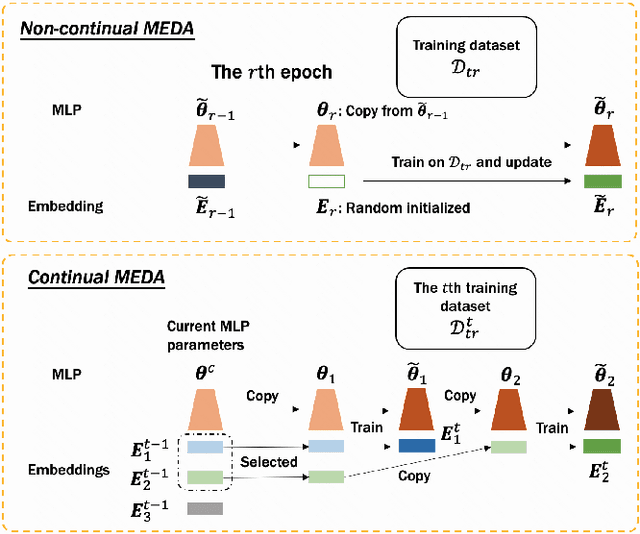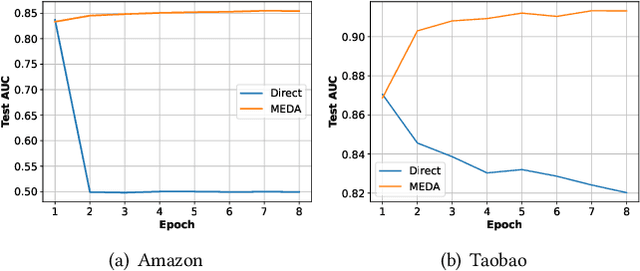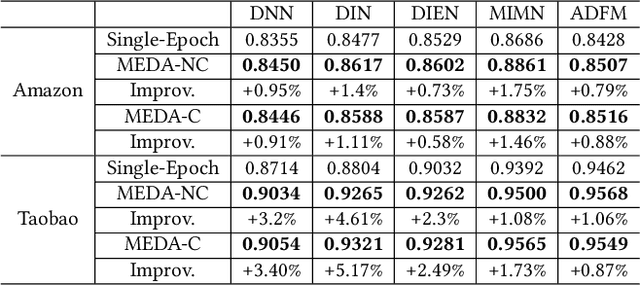Zhongxiang Fan
Multi-Epoch learning with Data Augmentation for Deep Click-Through Rate Prediction
Jun 27, 2024



Abstract:This paper investigates the one-epoch overfitting phenomenon in Click-Through Rate (CTR) models, where performance notably declines at the start of the second epoch. Despite extensive research, the efficacy of multi-epoch training over the conventional one-epoch approach remains unclear. We identify the overfitting of the embedding layer, caused by high-dimensional data sparsity, as the primary issue. To address this, we introduce a novel and simple Multi-Epoch learning with Data Augmentation (MEDA) framework, suitable for both non-continual and continual learning scenarios, which can be seamlessly integrated into existing deep CTR models and may have potential applications to handle the "forgetting or overfitting" dilemma in the retraining and the well-known catastrophic forgetting problems. MEDA minimizes overfitting by reducing the dependency of the embedding layer on subsequent training data or the Multi-Layer Perceptron (MLP) layers, and achieves data augmentation through training the MLP with varied embedding spaces. Our findings confirm that pre-trained MLP layers can adapt to new embedding spaces, enhancing performance without overfitting. This adaptability underscores the MLP layers' role in learning a matching function focused on the relative relationships among embeddings rather than their absolute positions. To our knowledge, MEDA represents the first multi-epoch training strategy tailored for deep CTR prediction models. We conduct extensive experiments on several public and business datasets, and the effectiveness of data augmentation and superiority over conventional single-epoch training are fully demonstrated. Besides, MEDA has exhibited significant benefits in a real-world online advertising system.
Multi-Epoch Learning for Deep Click-Through Rate Prediction Models
May 31, 2023Abstract:The one-epoch overfitting phenomenon has been widely observed in industrial Click-Through Rate (CTR) applications, where the model performance experiences a significant degradation at the beginning of the second epoch. Recent advances try to understand the underlying factors behind this phenomenon through extensive experiments. However, it is still unknown whether a multi-epoch training paradigm could achieve better results, as the best performance is usually achieved by one-epoch training. In this paper, we hypothesize that the emergence of this phenomenon may be attributed to the susceptibility of the embedding layer to overfitting, which can stem from the high-dimensional sparsity of data. To maintain feature sparsity while simultaneously avoiding overfitting of embeddings, we propose a novel Multi-Epoch learning with Data Augmentation (MEDA), which can be directly applied to most deep CTR models. MEDA achieves data augmentation by reinitializing the embedding layer in each epoch, thereby avoiding embedding overfitting and simultaneously improving convergence. To our best knowledge, MEDA is the first multi-epoch training paradigm designed for deep CTR prediction models. We conduct extensive experiments on several public datasets, and the effectiveness of our proposed MEDA is fully verified. Notably, the results show that MEDA can significantly outperform the conventional one-epoch training. Besides, MEDA has exhibited significant benefits in a real-world scene on Kuaishou.
 Add to Chrome
Add to Chrome Add to Firefox
Add to Firefox Add to Edge
Add to Edge